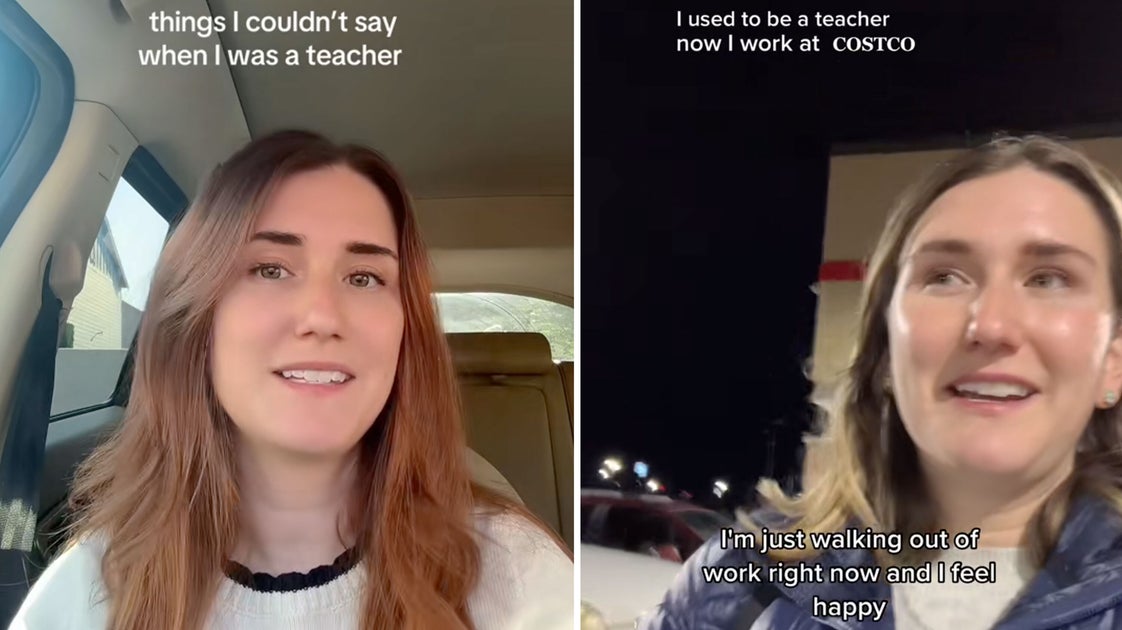
How Working At Costco Changed A Teacher’s Life
Maggie Perkins used to be a self-sacrificing “teacher martyr” who got paid “pennies” to take care of other people’s kids while barely making rent, she said.
This is the little-discussed “dark side” of teaching where you get “compensated emotionally instead of financially,” Perkins said. She got praised for performing a much-needed role for society, but she was still struggling to afford expenses for her own family.
At one point, Perkins “was teaching four different classes, which meant four different individual things to prepare for. But I didn’t have enough planning time to do it, so I was making my own resources for four classes, and still being called out of my planning to go sub for other people.”
Perkins recalled regularly staying at school until 7 p.m. to finish work she couldn’t do during the day. “I would kind of hate myself for doing that, because I had two very young children, and I was so tired of them knowing Mommy’s at school, not with our family,” she said.
Perkins had invested in a master’s degree in education theory and practice, and tried it all: She worked at public and private institutions. She tried big schools and little schools. Switched teaching subjects. Did a unionized school in Florida and a non-union school in Georgia. Taught middle schoolers and high schoolers history and language arts.
And yet, over these eight years as a teacher, she was deeply unhappy.
As she approached 30, Perkins recognized something had to give. She had started teaching middle schoolers for $31,000 per year, but she was only making $47,000 years later. “I could have stayed with the conditions for a lot more money, or I could have had better conditions and kept a low wage, but I couldn’t do both for the rest of my life,” she said.
So, in 2022, when she saw that Costco was opening a new store in Athens, Georgia, where she lived, Perkins applied for a clerk membership role and got hired.
“I really thought that Costco was going to be just like my ‘good enough for now’ job,” Perkins said. “And then, as I learned more about the company, it became very clear to me very quickly that I could happily work at the warehouse for the rest of my career.”
The Surprising Financial Opportunity She Had At Costco

Illustration: HuffPost; Photo: Getty Images
“At first, I wasn’t making more,” Perkins said. In her first job at Costco as a membership clerk, she earned $18.50 per hour. After every 1,000 hours of work, she got a $1 raise. She supplemented her income by freelancing for a tutoring company on the side.
But she quickly caught up as she worked more hours. “I was making $19.50, and then when I was doing the supervisor-in-training program, it was $29 an hour. You get time and a half on Sunday … I worked every Sunday because I wanted to.”
Through this manager training program, “I was pretty easily clearing what would have been $62,000 a year by only working a 40-hour week,” Perkins said, which was a marked contrast from working $47,000 “for a 60-, sometimes 70-hour week” as a teacher. In this way, “I was already making more when [I was] teaching, and I had not yet hit my first year of employment at Costco.”
Now, after doing warehouse stints as a front-end cashier and in the bakery, she earns $84,000 as a corporate Costco trainer and content developer who moved to Washington state in 2023 to work from the retailer’s headquarters.
“Another sign of psychological safety is that I don’t have to check my bank account before I buy coffee” anymore, she said.
Does She Have Any Regrets About Saying Goodbye To Teaching?

Perkins said she sometimes still dreams about teaching and misses seeing kids learn: “I loved it so much, it made it that much harder to walk away.” At the same time, “I don’t miss bus duty. I don’t miss working for a principal who had never taught in a classroom.”
What helped Perkins move on from teaching was how she felt freer, like a weight being lifted. At Costco, she got to take whole lunch breaks and leave her work at work.
“I used to have terrible sleep. I was medicated for anxiety and depression. I didn’t eat well, I wasn’t exercising,” Perkins said. “Now I have energy. I’m sleeping through the night … I’m just happier. I had to teach myself to go to the bathroom when I felt like I needed to go to the bathroom. As a teacher, you just hold it all the time.”
Perkins just wishes she had made this switch sooner. Sometimes she wonders how much better her life would have been emotionally and financially if she had never gone into education in the first place: “What if I had just not made pennies to do 60-hour weeks and have terrible leadership?”
One of the systemic education problems that Perkins believes led her to quit is how technology is replacing engagement in classrooms, “because we can measure memorization on a Chromebook much more easily than we can have a class discussion.”
“People who have these degrees and depth of knowledge, they’re no longer being used as the core teaching resource,” she said, which has a cascading effect: “Now parents don’t fully trust teachers. Admin kind of view teachers as the people who are just rolling out the curriculum.”
“Somebody said ‘Teaching got the best of me, and my family got the rest of me,’ and that kind of broke me.”
– Maggie Perkins
Perkins has made popular TikToks about her quitting experience. “I try to be really honest about it, because when I was in it, I could not really talk about it,” she said. “Teachers aren’t allowed to acknowledge that teaching is hard because it gets framed as complaining.”
A lot of people who comment have been teachers or teachers’ kids.
“They said, ‘it’s so good that you’re finally prioritizing your family, because I have all childhood memories of my mom being at their football games, their basketball games, their plays, but then showing up for us tired and grading at home,’” Perkins recalled. “And somebody said ‘Teaching got the best of me, and my family got the rest of me,’ and that kind of broke me.“
For teachers wondering whether to switch out of their field, Perkins said many of the skills that made her a good teacher transfer well to corporate America.
“I could walk into any room at any time and speak to a group of people. I can easily make a presentation. I work well with mixed personalities,” she said. “I don’t get flustered easily by tension. Once you’ve been gaslit by 12-year-olds, you don’t get flustered by adults who are like, ‘You didn’t send me the file.’”
Perkins said she could have had many different second careers with what she learned as a teacher, but she’s happy with where she landed.
“It could have been Home Depot … It could have been the service industry. It could have been self-employment, it didn’t have to be Costco. I’m glad that it was Costco. It was the right place, the right time,” she continued. “But teachers have so many skills, and they can transition into so many different industries and areas.“
To any teacher who relates to Perkins’ experience, she said it’s OK to try something new.
“I just would really say to teachers … please prioritize yourself,” Perkins said. “It’s not possible to know how much better you could feel because you haven’t tried leaving yet. And also that you’re not betraying your students, you’re not betraying yourself, you’re not betraying your teachers by leaving, because you are making your own life and health better.”
Cost of Living is a new series that reveals true stories of how people make money, lose money and deal with all the pressures of our current economic climate. Have a candid story about how you switched careers, spent a windfall, combined finances with a partner or survived a mass layoff? Or maybe you’ve been personally impacted by the current administration’s changes? We want to hear it all. Email monica.torres@huffpost.com.



